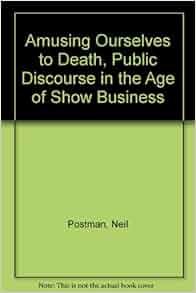

Also keep in mind: there were no photographs. Sure, politicians also gave hour-long speeches, but those were mostly supplemented with text and similar in structure and language. That’s because at the time, reading was both a way of entertainment and the arena of choice for public discourse. That means one in five Americans read it. Common Sense, Thomas Paine’s 49-page pamphlet that advocated for the US to seek independence from Great Britain, was printed 500,000 times – in 1776. However, even if your book sells ‘just’ one million copies, it’s already part of the top 0.001%.īut not too long ago, things were different. Can you imagine a book being that popular? In recent history, only Hunger Games comes close, with about 65 million copies sold. That’s about a third of the entire population.

NEIL POSTMAN AMUSING OURSELVES TO DEATH PDF
If you want to save this summary for later, download the free PDF and read it whenever you want.ĭownload PDF Lesson 1: Less than 200 years ago, everyone was well-read.Ī few days ago, the 52nd Super Bowl glued over 100 million Americans to their TVs. If you’re wondering why we’ve become such bad readers, this is the right place to learn.
NEIL POSTMAN AMUSING OURSELVES TO DEATH TV
Everything you see on TV was twisted to entertain, so it’s hard to learn anything.Telegraphy and photography stripped information from its context.The 19th century was the age of reading.Here’s his line of argument in 3 lessons: As early as 1985, it claimed that the rise of TV would be our fall. So when, in the very year it “came true,” Neil Postman showed up to the world’s largest book fair and claimed Huxley was much closer to reality, he caused quite a stir.Īmusing Ourselves To Deathwas the result of his appearance. Especially after World War II, Orwell’s prediction felt much more likely. One claims a totalitarian regime will watch our every move, the other assumes we’ll be numbed to oblivion with consumerism and drugs. Two you might be familiar with from high school days are George Orwell’s 1984 and Aldous Huxley’s Brave New World. Video games like Bioshock, movies like The Matrix, and lots of classic books fall into the dystopian genre. This is called dystopia – a miserable society. Some of the world’s most popular science-fiction explores what would happen if not only we tried to build such a place, but also if it went wrong. For example, if you want to help someone deal with rejection you might say: “Life’s not always a bowl of cherries.” A popular German equivalent we have is: “Life’s not a pony farm.” The idea is that on a pony farm, everything is dandy all the time.Ī perfect world, in which everyone is always happy, is called utopia. One thing that’s always fascinated me in English class is how our idioms translate and vice versa. This is an indictment that Postman has laid down and, so far as I can see, an irrefutable one.Listen to the audio of this summary with a free reading.fm account: “A brilliant, powerful, and important book. This is an indictment that Postman has laid down and, so far as I can see, an irrefutable one.” –Jonathan Yardley, The Washington Post Book World It is also a blueprint for regaining control of our media, so that they can serve our highest goals. Amusing Ourselves to Death is a prophetic look at what happens when politics, journalism, education, and even religion become subject to the demands of entertainment. Now, with television joined by more sophisticated electronic media-from the Internet to cell phones to DVDs-it has taken on even greater significance. Originally published in 1985, Neil Postman’s groundbreaking polemic about the corrosive effects of television on our politics and public discourse has been hailed as a twenty-first-century book published in the twentieth century. "It's unlikely that Trump has ever read Amusing Ourselves to Death, but his ascent would not have surprised Postman.” - CNN What happens when media and politics become forms of entertainment? As our world begins to look more and more like Orwell's 1984, Neil's Postman's essential guide to the modern media is more relevant than ever.


 0 kommentar(er)
0 kommentar(er)
